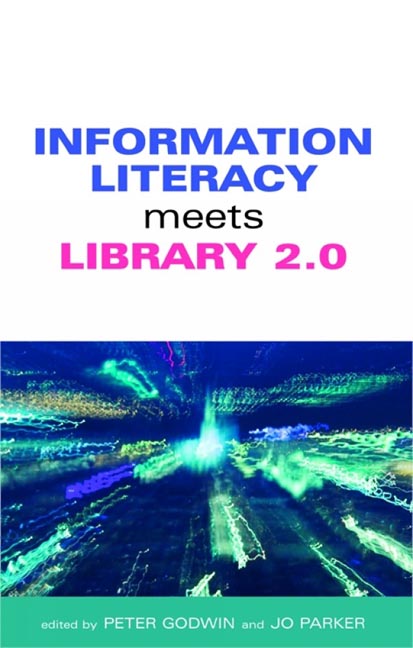Book contents
- Frontmatter
- Contents
- Contributors
- Acknowledgements
- Part 1 The basics 1
- Part 2 Library 2.0 and the implications for IL learning 37
- Part 3 Library 2.0 and IL in practice 75
- 6 Engage or enrage: the blog as an assessment tool
- 7 Using Wikipedia to eavesdrop on the scholarly conversation
- 8 Information literacy and RSS feeds at LSE
- 9 Library instruction on the go: podcasting at the Kresge Library
- 10 PennTags at the University of Pennsylvania
- 11 Sparking Flickrs of insight into controlled vocabularies and subject searching
- 12 Joining the YouTube conversation to teach information literacy
- 13 Going Beyond Google at The Open University
- 14 Using Web 2.0 to enhance the Staffordshire University Assignment Survival Kit (ASK)
- Part 4 The future
- Index
6 - Engage or enrage: the blog as an assessment tool
from Part 3 - Library 2.0 and IL in practice 75
Published online by Cambridge University Press: 08 June 2018
- Frontmatter
- Contents
- Contributors
- Acknowledgements
- Part 1 The basics 1
- Part 2 Library 2.0 and the implications for IL learning 37
- Part 3 Library 2.0 and IL in practice 75
- 6 Engage or enrage: the blog as an assessment tool
- 7 Using Wikipedia to eavesdrop on the scholarly conversation
- 8 Information literacy and RSS feeds at LSE
- 9 Library instruction on the go: podcasting at the Kresge Library
- 10 PennTags at the University of Pennsylvania
- 11 Sparking Flickrs of insight into controlled vocabularies and subject searching
- 12 Joining the YouTube conversation to teach information literacy
- 13 Going Beyond Google at The Open University
- 14 Using Web 2.0 to enhance the Staffordshire University Assignment Survival Kit (ASK)
- Part 4 The future
- Index
Summary
In November 2006, 66 students at the University of Northampton, UK, embarked on an information blog assessment, created by library staff to teach information skills. This chapter is the story behind the assessment: the assessment brief, the reactions of students, the impact on tutors and our various successes and failings as we journeyed towards the final deadline day of 7 May 2007.
The assessment brief
A significant feature of the information blog was its integration as a summative assessment into a first-year information skills module offered by the University's business school. The module curriculum was delivered by academic librarians and business school academics. It included 13 weeks of lectures and seminars dedicated to topics such as censorship, web usability, information management, search strategies, evaluating information, Web 2.0, and the information society. Using Blogger (www.blogger.com), the students were asked to write a minimum of ten blog posts of around 250 words reflecting upon the range, quality, reliability, effectiveness, delivery and organization of the information they encountered on a daily basis. They were instructed that their blogs should be evaluative and analytical. From 20 November 2006 to 7 January 2007 the students were given the chance to experiment with their blogs and tutors gave formative feedback, while the summative period ran from 8 January 2007 to midnight on 7 May 2007. It was stipulated that the students should spread their posts out evenly across the summative period, rather than writing all their entries at the eleventh hour. The choice of post topic was deliberately left open to allow the students the freedom to blog on issues within their information environment that really mattered to them, as is the nature of true blogging. They were also given advice on blog style and etiquette, privacy issues and topic ideas. The information blog assessment formed 50% of the students’ module marks, which we hoped would sufficiently motivate the students to post regularly and work hard on their blogs, and it was administered and marked by the academic librarians.
So, why did we choose a blog? We thought the blog online diary format offered specific pedagogic benefits:
1 The possibility of engaging students in an assessment over a sustained period of time, linking week-by-week to the curriculum, potentially countering strategic and surface learning.
- Type
- Chapter
- Information
- Information Literacy Meets Library 2.0 , pp. 77 - 86Publisher: FacetPrint publication year: 2008
- 2
- Cited by



